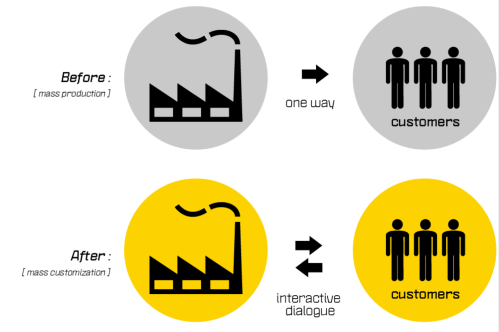I was talking with a friend last week about the challenges of developing a customer-centric culture in large organizations. He used the word “customerization” to refer to the process of developing a “customerized” culture. I found a definition in Wikipedia as follows: “Customerization is the customization of products or services through personal interaction between a company and the customer. A company is customerized when it’s able to dialogue with individual customers and respond by customizing its products, services, and messages on a one-to-one basis. Customerization requires a company to shift its business model from seller-centric to buyer-centric. My friend, who has an organizational change background, was saying that the concept of “customer” has very wide application because when a person thinks of another person – colleague, boss, partner, buyer – as a customer, it acts as a way of developing relationships between people. He recalled reading somewhere that
“If you want to be a leader you first have to be a person.”
He then concluded “to be customer-centric you must be person-centric.” He believes that this touches on a fundamental human truth – “that if people are responded to as humans inside and outside a business, that is to be seen and heard, it creates such a strong connection as to engender a powerful loyalty.” If “customerization” of an organization’s culture is based on these fundamentals, and of course delivers products or services of perceived value, then it seems that it will have very loyal employees and customers. We have seen with companies like Intuit, NetApp, Mercedes Benz, Genentech, Salesforce and W.L. Gore – that rank highly among the “100 best companies to work for” – both their employees and customers are fiercely loyal. How do you think your company does on the fundamentals of “customerization”?




